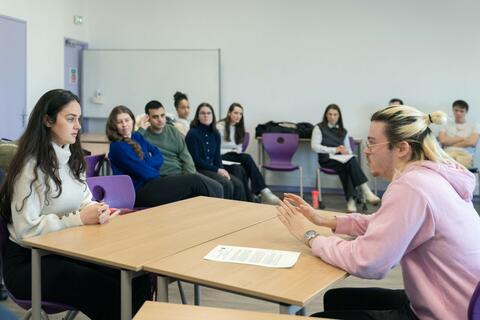
The Healing Stage: How Theater Enhances Medical Care
In an effort to improve the training of future doctors, Sorbonne University has introduced an innovative program in collaboration with the Cours Florent. Integrated into the Department of Care Relations, this module, titled Theater and Relational Skills (TER), focuses on communication as a core component of medical practice.
A teaching approach that combines technique and humanity
“Being a good doctor is not just about being a technician or a diagnostic expert,” says Laure Gossec, Professor of Rheumatology, co-founder, and director of the Department of Care Relations. For the past decade, Sorbonne University has been committed to enhancing the human and relational skills of its future doctors by creating the Department of Care Relations. This department offers courses that bring the doctor-patient relationship back to the center of medical practice.
The Theater and Relational Skills module, launched in 2018 by Alexandre Duguet, then Vice-Dean of the Faculty of Health, and Simone Strickner, Director of the Cours Florent, is one of the pillars of this initiative. It relies on a unique collaboration between the Faculty of Health and the Cours Florent, a leading institution in theater education. “The relational aspect in disease management is essential for both the patient’s well-being and treatment adherence, especially in a world where diagnosis may soon be partially automated by artificial intelligence,” says Laure Gossec, who coordinates the module with Dr. Manon Allaire. The objective is clear: to train doctors who combine technical expertise with human qualities.
Realistic scenarios
Each year, third-year medical students participate in a four-hour morning session in small groups, accompanied by final-year Cours Florent students. These theater students bring their acting expertise to life through realistic scenarios. “We’ve imagined common and essential situations,” explains Laure Gossec. For instance, a doctor running late must deal with a frustrated patient, another who is anxious about their health, or someone depressed after a breakup. In another scenario, the doctor has to explain to a patient that their MRI results are unavailable due to a computer failure. “These cases challenge the doctors without being too overwhelming, such as announcing a terminal diagnosis,” says the director.
These exercises allow future doctors to develop their listening skills and manage delicate situations while maintaining patient trust. “In just eight minutes, medical students must identify the reason for the consultation while preserving a good relationship with the patient,” the professor explains. This duration reflects the average consultation time in general practice in France, pushing students to refine their listening and time-management abilities.
The contribution of theater to medical education
Thanks to their training, Cours Florent students bring realistic performances to the simulations. “Medical students find this exercise much more enriching when roles are played by theater students rather than healthcare professionals or fellow medical students,” notes Laure Gossec.
After each simulation, a debriefing session is held with medical and Cours Florent instructors to analyze the verbal, non-verbal, and paraverbal aspects of communication. “Everything is done in a non-judgmental and supportive environment. The goal is not to stigmatize but to improve together as a group,” emphasizes the rheumatologist. “It’s also enriching for the teachers, who learn a lot from these sessions.”
This partnership also benefits Cours Florent students, who experience “theater beyond the stage.” “They discover that their artistic skills can serve other purposes, such as improving the caregiver-patient relationship,” adds Laure Gossec. The interaction between future actors and future doctors creates an interesting mirror effect, with each learning from the other’s field.
A demanding pedagogy
In addition to theatrical simulations, the program relies on other educational tools such as videos, patient testimonials, and analysis of filmed interactions.
Furthermore, this teaching is part of a broader curriculum that addresses various aspects of the doctor-patient relationship. “We work on topics such as biases, sexual violence in medicine, announcing a death according to cultural and family approaches, and discrimination—whether it involves people with disabilities, obesity, or transgender patients. We also address issues like palliative care,” details the rheumatologist.
In total, students accumulate 46 hours of training on these topics between their second and sixth years of medical school—“twice as many hours as those dedicated to cardiology,” adds Laure Gossec. Despite their busy schedules, with weeks reaching nearly 50 hours, medical students willingly participate in these courses. For some, these sessions offer a chance for introspection. “Sometimes, they realize that they don’t want to work in direct patient care and can then consider more technical specializations,” says Professor Gossec.
After five years, the Theater and Relational Skills module has become a benchmark at the Faculty of Health of Sorbonne University. This unique partnership with the Cours Florent helps train a new generation of doctors who are both competent and attentive to their patients’ needs. “We are one of the few faculties, perhaps the only one, to offer a structured course on the doctor-patient relationship with a total of 1,600 hours of classes—a volume that reflects the importance we place on relational care in medical training,” concludes Laure Gossec.
By Justine Mathieu
